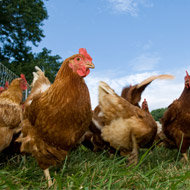Free-range status to be applied on flock-by-flock basis

The changes will allow poultry meat to be sold as free-range in the event of an outbreak of avian flu for a period of 12 weeks.
The government has confirmed that free-range status will be applied on a flock-by-flock basis when birds are forced to be kept inside by a veterinary housing order.
According to the National Farmers Union (NFU), the changes will allow poultry meat to be sold as free-range in the event of an outbreak of avian flu for a period of 12 weeks. They also give meat producers reassurance that they will not have to sell their birds into the indoor-reared market.
The move comes after months of campaigning by the NFU and other farming organisations to get the rules changes for the producer’s benefit. The efforts began in February last year when an outbreak of avian influenza saw vets impose a housing order for all free-range poultry.
As a consequence of this housing order, it became apparent that the rules that allow housed poultry to be marketed as free-range should be applied on a flock-by-flock basis.
“This confirmation provides much-needed certainty for our free-range poultry meat members and will go a long way to resolve concern in the sector,” said NFU chief poultry adviser Gary Ford. “Our members were at the heart of this effort and it shows the benefit of farmers working alongside NFU staff in the UK and Brussels.”
He continued: “Approximately 650,000 free-range broilers are reared every week in England and Wales so this is a decision that will affect farmers across the country. The financial benefit of this decision for affected members cannot be underestimated.
“Of course we hope that we do not have to enter a period where a housing order must be imposed but poultry meat producers are now in a significantly better position to deal with its effects.”



 The veterinary mental health charity Vetlife is inviting the veterinary community to join it for a sponsored cold-water dip.
The veterinary mental health charity Vetlife is inviting the veterinary community to join it for a sponsored cold-water dip.